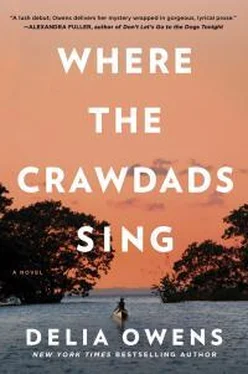Kya watched others. The females got what they wanted—first a mate, then a meal—just by changing their signals.
Kya knew judgment had no place here. Evil was not in play, just life pulsing on, even at the expense of some of the players. Biology sees right and wrong as the same color in different light.
She waited another hour for Tate, and finally walked toward the shack.
• • •
THE NEXT MORNING, swearing at the shreds of cruel hope, she went back to the lagoon. Sitting at the water’s edge, she listened for the sound of a boat chugging down the channel or across the distant estuaries.
At noon she stood and screamed, “TATE, TATE, NO, NO.” Then dropped to her knees, her face against the mud. She felt a strong pull out from under her. A tide she knew well.
21. Coop
1961
Hot wind rattled the palmetto fronds like small dry bones. For three days after giving up on Tate, Kya didn’t get out of bed. Drugged by despair and heat, she tossed in clothes and sheets damp from sweat, her skin sticky. She sent her toes on missions to scout for cool spots between the sheets, but they found none.
She didn’t note the time of moonrise or when a great horned owl took a diurnal dive at a blue jay. From bed, she heard the marsh beyond in the lifting of blackbird wings, but didn’t go to it. She hurt from the crying songs of the gulls above the beach, calling to her. But for the first time in her life, did not go to them. She hoped the pain from ignoring them would displace the tear in her heart. It did not.
Listless, she wondered what she had done to send everyone away. Her own ma. Her sisters. Her whole family. Jodie. And now Tate. Her most poignant memories were unknown dates of family members disappearing down the lane. The last of a white scarf trailing through the leaves. A pile of socks left on a floor mattress.
Tate and life and love had been the same thing. Now there was no Tate.
“Why, Tate, why?” She mumbled into the sheets, “You were supposed to be different. To stay. You said you loved me, but there is no such thing. There is no one on Earth you can count on.” From somewhere very deep, she made herself a promise never to trust or love anyone again.
She’d always found the muscle and heart to pull herself from the mire, to take the next step, no matter how shaky. But where had all that grit brought her? She drifted in and out of thin sleep.
Suddenly, the sun—full, bright, and glaring—struck her face. Never in her life had she slept until midday. She heard a soft rustling sound and, raising herself onto her elbows, saw a raven-sized Cooper’s hawk standing on the other side of the screen door, peering in. For the first time in days, an interest stirred in her. She roused herself as the hawk took wing.
Finally, she made a mush of hot water and grits and headed to the beach to feed the gulls. When she broke onto the beach, all of them swirled and dived in flurries, and she dropped to her knees and tossed the food on the sand. As they crowded around her, she felt their feathers brushing her arms and thighs, and threw her head back, smiling with them. Even as tears streamed her cheeks.
• • •
FOR A MONTH AFTER JULY 4, Kya did not leave her place, did not go into the marsh or to Jumpin’s for gas or supplies. She lived on dried fish, mussels, oysters. Grits and greens.
When all her shelves were empty, she finally motored to Jumpin’s for supplies but didn’t chat with him as usual. Did her business and left him standing, staring after her. Needing people ended in hurt.
A few mornings later, the Cooper’s hawk was back on her steps, peering at her through the screen. How odd , she thought, cocking her head at him. “Hey, Coop.”
With a little hop, he lifted, made a flyby, then soared high into the clouds. Watching him, at last, Kya said to herself, “I have to get back into the marsh,” and she took the boat out, easing along the channels and slipstreams, searching for bird nests, feathers, or shells for the first time since Tate abandoned her. Even so, she couldn’t avoid thoughts of him. The intellectual fascinations or the pretty girls of Chapel Hill had drawn him in. She couldn’t imagine college women, but whatever form they took would be better than a tangled-haired, barefoot mussel-monger who lived in a shack.
By the end of August, her life once more found its footing: boat, collect, paint. Months passed. She only went to Jumpin’s when low supplies demanded, but spoke very little to him.
Her collections matured, categorized methodically by order, genus, and species; by age according to bone wear; by size in millimeters of feathers; or by the most fragile hues of greens. The science and art entwined in each other’s strengths: the colors, the light, the species, the life; weaving a masterpiece of knowledge and beauty that filled every corner of her shack. Her world. She grew with them—the trunk of the vine—alone, but holding all the wonders together.
But just as her collection grew, so did her loneliness. A pain as large as her heart lived in her chest. Nothing eased it. Not the gulls, not a splendid sunset, not the rarest of shells.
Months turned into a year.
The lonely became larger than she could hold. She wished for someone’s voice, presence, touch, but wished more to protect her heart.
Months passed into another year. Then another.
PART 2 The Swamp
22. Same Tide
1965
Nineteen years old, legs longer, eyes larger and seemingly blacker, Kya sat on Point Beach, watching sand crabs bury themselves backward into the swash. Suddenly, from the south, she heard voices and jumped to her feet. The group of kids—now young adults—she’d watched occasionally through the years ambled toward her, tossing a football, running and kicking the surf. Anxious they would see her, she loped to the trees, sand tearing from her heels, and hid behind the broad trunk of an oak tree. Knowing how odd this made her.
Not much has changed , she thought, them laughing, me holing up like a sand crab . A wild thing ashamed of her own freakish ways.
Tallskinnyblonde, Ponytailfreckleface, Alwayswearspearls, and Roundchubbycheeks romped the beach, tangled in laughs and hugs. On her rare trips to the village, she’d heard their slurs. “Yeah, the Marsh Girl gits her clothes from colored people; has to trade mussels for grits.”
Yet after all these years, they were still a group of friends. That was something. Silly-looking on the outside, yes, but as Mabel had said several times, they were a sure troop. “Ya need some girlfriends, hon, ’cause they’re furever. Without a vow. A clutch of women’s the most tender, most tough place on Earth.”
Kya found herself laughing softly with them as they kicked salt water on one another. Then, shrieking, they rushed as one into the deeper surf. Kya’s smile faded when they pulled themselves out of the water and into their traditional group hug.
Their squeals made Kya’s silence even louder. Their togetherness tugged at her loneliness, but she knew being labeled as marsh trash kept her behind the oak tree.
Her eyes shifted to the tallest guy. Wearing khaki shorts and no shirt, he threw the football. Kya watched the cords of muscles bunching on his back. His tan shoulders. She knew he was Chase Andrews, and over the years, ever since he nearly ran her over on his bicycle, she’d seen him with these friends on the beach, walking into the diner for milk shakes, or at Jumpin’s buying gas.
Now, as the group came closer, she watched only him. When another tossed the ball, he ran to catch it and came close to her tree, his bare feet digging in the hot sand. As he raised his arm to throw, he happened to glance back and caught Kya’s eyes. After passing the ball, without giving any sign to the others, he turned and held her gaze. His hair was black, like hers, but his eyes were pale blue, his face strong, striking. A shadow-smile formed on his lips. Then he walked back to the others, shoulders relaxed, sure.
Читать дальше











